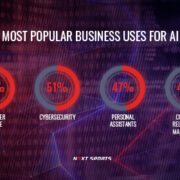A year and counting until Paris 2024, and the sports industry is readying itself for an Olympic Games like no other. Despite the absence of fans due to Covid-19 restrictions, Tokyo 2020 heralded a “new era” for the Olympiad and its ability to drive fan engagement digitally. The baton now passes on to Paris as the multi-sport event – with the welcome return of spectators – shines a new light on sport’s digitalization and offers a global platform for truly impactful innovation.
The International Olympic Committee (IOC) has outlined digitalization as an important objective for expanding its audience reach and developing the Olympic sports that will be on show in a year’s time. As we look ahead to the next summer edition, it feels as though there’s a lot more at stake – given that the Olympic Games will not only aim to leave a legacy for the French capital and its bid to become a “smart city”, but also how digital initiatives serve the growth of the wider Olympic ecosystem. Digital transformation represents a key pillar within the IOC’s Olympic Agenda 2020+5 and can serve the Olympic Movement in multiple ways.
Furthermore, this Games more than any other will adopt new mobility solutions and digital resources that specifically address the sports industry’s carbon footprint. Meanwhile, data analysis and digital fan engagement can help make physical activity more inclusive for inner-city communities. There are many avenues which the Olympic Movement is modernizing. Here, we highlight five ways digital transformation is shaping Paris 2024 and discuss their significance beyond the Olympic Games.
1. DATA ANALYSIS CENTRAL TO FAN & STAKEHOLDER RELATIONSHIPS
The IOC relies a great deal on data analysis in preparation for its global showpiece. This has been true ever since the governing body rolled out in 2003 its Information, Knowledge and Games Learning (IKL) management service, which encourages and enables each respective Organising Committee for the Olympic Games (OCOG) to share their learnings through the transfer of knowledge materials. This has led Paris 2024 to tailor technologies to its unique end-user needs.
Paris 2024 became the first OCOG to employ an expert dedicated solely to optimizing the event’s planning and operations through data analysis. Kevin Martel, Manager for Games Knowledge and Data at Paris 2024, says that – as the IOC’s efforts in data capture “have become more sophisticated over the years” – by leveraging data learnings from Tokyo 2020, it has helped develop data dashboards that allow Paris 2024 members to analyze its stakeholder activities across every venue.
Paris 2024 has also launched several digital fan initiatives designed to drive engagement and personalize the fan experience. For example, Paris 2024 has opened the Olympic Marathon to the general public for the first time in the event’s history – inviting entrants to complete running challenges via its ClubParis2024 digital platform, launched in partnership with Alibaba Cloud, the ecommerce giant’s digital technology and intelligence arm. In doing so, Paris 2024 has augmented its digital touchpoints in a way that inspires user participation across its events and also helps to tailor the fan experience based on its user interactions.
2. OLYMPIC GAMES IS A SPRINGBOARD FOR FUTURE SMART CITIES
Transforming Paris into a smart city was central to its initial bid in 2015 to host the Olympic and Paralympic Games. The Mayor of Paris, Anne Hidalgo, has since outlined her vision for turning Paris into the “15-minute city”, which involves creating a new urban model built on self-sufficient communities, as well as plans to make every street in the French capital bicycle-friendly by 2024.
Paris 2024 launched “the biggest public engagement initiative” ever carried out during its Olympic bid – in an attempt to ensure the general public was given a say on its proposals. Since winning rights to host the Olympic and Paralympic Games, Paris 2024 has sought innovation projects to support public transport throughout the city. For example, Eco-Counter’s turn-key solutions for counting pedestrian activity will help measure commuter behavior and leverage data to inform changes to the city’s transport infrastructure in time for the Olympic Games.
As part of Paris 2024’s infrastructure planning, the OCOG has also partnered with the UK-based software company OnePlan to implement digital twins for all of its venues using GSI mapping technology, with the view of making the delivery of the Games – including the development and management of its stadia – more efficient. This is achieved by helping the OCOG “better visualize data” whenever preparing event infrastructure and transports links, reducing the time stakeholders spend on site, while also enabling rights-holding broadcasters (RHB) and sponsors to develop their Games operations virtually.
3. ARTIFICIAL INTELLIGENCE TO PLAY BIGGER ROLE IN CONTENT PRODUCTION
During last year’s World Broadcaster Meeting (WBM), Olympic Broadcasting Services (OBS), the IOC’s centralized broadcaster, outlined plans to deliver “an unprecedented amount of content” to Paris 2024’s RHBs “in a wider range of options”. For context, Tokyo 2020 saw OBS produce 30 percent more content than Rio 2016. Images were distributed to global broadcasters via OBS Cloud, a dedicated cloud-production suite built in partnership with TOP partners Alibaba and Intel to streamline the delivery of video content to media organizations.
In the two years since Tokyo 2020 was held behind closed doors, the sports industry has seen an explosion of artificial intelligence (AI) startups market solutions designed to generate automated and personalized content for rights holders and their media partners. For example, WSC Sports provides generative highlights to major sports brands such as the National Basketball Association (NBA). Considering the wealth of AI-driven content solutions now available on the market, Paris 2024 will see the IOC’s RHB partners and Olympic stakeholders able to generate greater volumes of content, too, personalized to their digital audiences.
4. ATHLETE PERFORMANCE DATA INSPIRING NEW DIGITAL ENGAGEMENT TOOLS
During recent Olympic Games, the IOC and its technology partners have introduced AI-powered tools to enhance the athlete experience. By way of example, Intel first introduced its 3D Athlete Tracking (3DAT) performance analytics platform during the USA track and field trials for Tokyo 2020 and made real-time competition data during the Olympic sprint events available to IOC’s RHB partners to enhance their broadcasts with unique data overlays.
As the focus turns to Paris 2024, Olympic stakeholders are also leveraging the athlete experience to drive engagement during regional events. For example, TOP sponsor Atos partnered with the European Olympic Committees (EOC) to launch a mobile app in time for the 2023 European Games, which allows everyone from event stakeholders and spectators, to volunteers and athletes to sign up using their very own European Games ID.
While the app provided on-demand video content and information for upcoming EOC events, the platform also includes an exclusive highlights function dedicated only to athletes. Atos pitched it as an “invaluable companion” for athletes during their journey to Paris 2024. As athlete data becomes more influential in sport’s digital transformation, the question remains: how can the IOC re-imagine its commercial model to account for the athlete, their data, and what they both bring to the digital Games experience?
5. DIGITAL TRANSFORMATION SERVING THE OLYMPICS’ CLIMATE EFFORTS
In 2021, Paris 2024 joined the global Race to Zero campaign, led by the United Nations Framework Convention on Climate Change (UNFCCC), which aims to “rally businesses, cities, and the sport community towards a zero-carbon economic recovery”. As part of its environmental ambitions, the OCOG outlined plans to trial and develop innovative solutions to help halve the Olympic Games’ carbon emissions and has since rolled out several climate initiatives.
For example, Atos was called upon last year to deliver a digital platform designed to help decarbonize the Paris 2024 Olympic Games’ Athletes’ Village, which will see the French technology company collaborate with Solideo, the public body in charge of Paris 2024’s infrastructural projects. The “Urban Data Platform” will leverage data analytics to measure the environmental impact of the Athletes’ Village, based in the Seine-Saint-Denis commune, using smart devices.
WHAT’S N3XT?
Data collection and data analysis underpin the IOC’s digital transformation efforts. It comes, therefore, as little surprise that Paris 2024’s innovation drive places the same level of importance on data capture – whether it’s used for serving public transport, digital fan experiences, stakeholder and venue management, or reducing the event’s environmental impact.
In a recent article on how artificial intelligence (AI) and machine learning models serve sport’s data transformation, our Chief Information Officer (CIO) Motasem El Bawab outlines N3XT Sports’ mission “to make data more accessible and understandable to sports properties”. For other major events to follow Paris 2024’s lead, understanding how data is currently used across the organizer’s entire digital framework is a fundamental first step towards enhancing operational efficiencies, expanding its digital portfolio, and maximizing its fan data.
Our team at N3XT Sports works tirelessly to develop and implement data and digital transformation strategies across a multitude of sports properties at federation level, competition level, and club level. To find out more about how N3XT Sports can strengthen your data-collection capability, fill out the form below, and we’ll be in touch. Our goal is to drive the digitalization of the sports industry and our clients.




